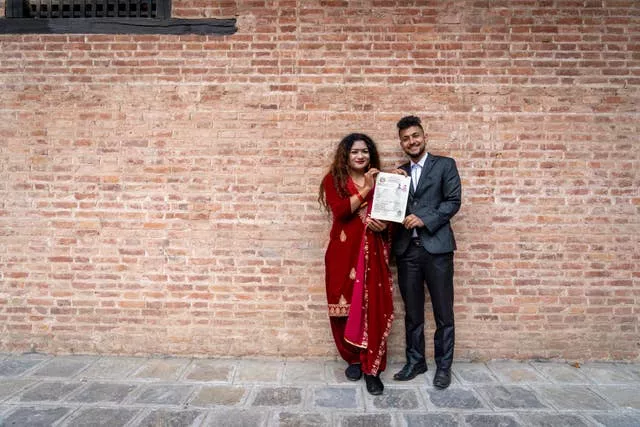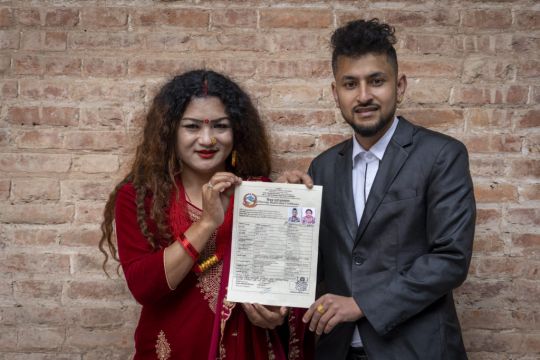The first gay couple in Nepal to have their same-sex marriage officially recognised have vowed to campaign for changes in the law to help others like them to get married.
Surendra Pandey and Maya Gurung were able to legally register their marriage at a village council office this week in the mountains west of the capital, Kathmandu.
Pandey is a man and Gurung is a transgender woman. Nepal does not allow its citizens to change the sex assigned at birth on their official documents.
“We will continue our campaign for same-sex marriage and fight to bring equality to sexual minorities in the country so that generations of people will not have to suffer like we all did,” Gurung told reporters on Friday in Kathmandu.

Other provisions in the law like inheritance, property rights and the right to adopt children have still to be updated in line with the recognition of same-sex-marriages.
The couple along with gay rights groups have been struggling for years to get the government to legally register same-sex marriages.
Earlier this year, Nepal’s supreme court issued an interim order enabling the registration of same-sex marriages for the first time.
Even after the court rulings, officials had initially refused to register the marriage.
Along with Sunil Babu Pant, an openly gay former parliamentarian and leading LGBT+ rights activist, the couple filed cases with the Kathmandu District Court and High Court but their pleas were rejected.
Earlier this week, the Home Ministry made changes to enable all local administration offices to register same-sex marriages.
The couple travelled back to Gurung’s village and got their marriage registered on Wednesday.

“Finally we have gotten legal recognition. Not just us, but all the sexual minority people who had been waiting anxiously for so long for this day are happy,” Pandey said.
Now the Himalayan nation has become only the second country in Asia and the first in South Asia to allow it.
Gay rights activists have clarified that the new provisions in Nepal allows anyone to marry anyone with their sexual preference in the country.
Since 2011, Nepalis who do not identify as female or male are able to choose “third gender” on their passports and other government documents. The constitution adopted in 2015 also explicitly states there can be no discrimination on the basis of sexual orientation.
“It is just not same sex-marriage, but it is very inclusive” said Mr Pant. “Now man can marry woman, which was already there. Now man can marry man, woman can marry woman, as we have three genders — male, female and others. Others can marry others also and others can marry man.”
“It is a whole lot of inclusive, so I like to call it a rainbow marriage is possible in Nepal,” he said.
The couple married six years ago at a temple following Hindu tradition, with a priest conducting the rituals among friends and family, but they had no certificate showing their marriage was legal until now.







